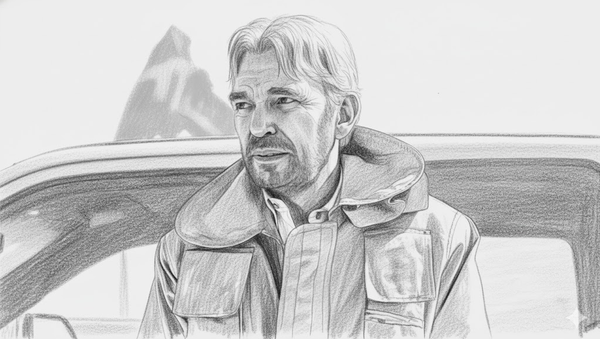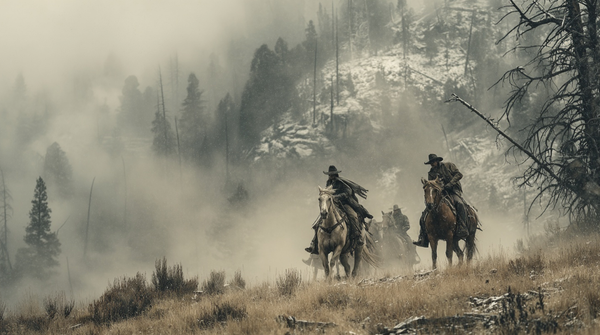“Landman” Deep Dive: The Human Dilemma Inside the Capitalist Machine

Prologue: When Black Gold Meets the Ambition of Screen Narrative
Taylor Sheridan’s “Landman” marks a bold experiment in television storytelling. This isn’t a traditional industry drama or workplace ensemble. Instead, it takes a riskier—but more honest—route: it turns the camera toward the most primal, most naked mechanism inside contemporary American capitalism—oil extraction. Out on the West Texas plains dominated by drilling rigs, we see not just how an industry operates, but the complete process by which the entire economic system transforms people, land, labor, and life itself into tradeable commodities. The show’s real value isn’t in declaring whether the oil industry is good or bad. It lies in its almost surgical precision in dissecting how the logic of capital permeates every relationship, every decision, every moral choice. It refuses easy answers because it recognizes that reality doesn’t have easy answers. It simply shows—and invites the audience to recognize their own position within that showing.
Chapter One: “Up” and “Down”—A Vertical Universe of Power
The most striking narrative design in “Landman” is its spatialization of class structure. This isn’t a metaphorical literary trick; it’s a literal division of physical space. The show deliberately breaks the oil ecosystem into three distinct tiers, each with its own rules, language, and survival logic.
At the lowest level—the drill site—we see the daily grind of the roughnecks. The camera neither romanticizes nor demonizes; it adopts a near-documentary calm, showing the real texture of the environment: blistering heat, dust, deafening machinery, and the constant risk of fatal accidents. These workers wager their bodies in exchange for hourly pay. Their labor is concrete, material, and dangerous. The sudden well blowout in episode one isn’t there to manufacture drama; it establishes a fundamental premise: in this system, the lives of those at the bottom are quantifiable variables—calculable, measurable, and folded into cost accounting. When flames swallow the rig, we’re not witnessing a singular tragedy; we’re seeing a routine part of the system’s operation.
In sharp contrast is the “up” world—private jet cabins, beautifully appointed offices, and country club golf courses. Here, Jon Hamm’s oil magnate Monty Miller and Demi Moore’s Cami Miller represent the apex of the capital food chain. They manipulate numbers, contracts, equity structures, and political relationships. In their world, oil isn’t a substance that must be pulled from the earth; it’s a figure on a balance sheet. They don’t need to understand drilling mechanics, or how many hours a roughneck works, nor face the blood and aftermath of industrial accidents. Their work is abstract, financialized, and insulated from the material world.
Caught in the middle is Tommy Norris—the landman played by Billy Bob Thornton. He inhabits the liminal space between these worlds. He’s the system’s interpreter and mediator: accountable upward to oil barons, while managing concrete problems downward among workers, landowners, and local officials. His job requires fluency in both worlds’ languages and logics. He’s seen the blood at the drill site and sat in private jets; he knows what it means when a working family loses its breadwinner, and understands the political ripple effects when a quarterly profit dips in the boardroom. This “in-betweenness” makes Tommy the show’s most tragic figure. He cannot pretend ignorance of suffering at the bottom—he confronts it daily. But he cannot change the logic at the top—he depends on the system to survive. He is the crucial lubricant inside the capitalist machine—people like him keep the system running even when it’s riddled with contradictions and injustices. The psychological toll of this ongoing mediation is the show’s real core concern.
Chapter Two: The Alienation of Labor—When Human Activity Loses Meaning
To grasp what “Landman” is truly interrogating, we must revisit Marx’s concept of “alienated labor” in Capital. It sounds academic, but it describes something many modern people feel: your work is severed from your life; your output is disconnected from you; your capabilities become someone else’s gain while you feel increasingly hollow.
“Landman” demonstrates this with textbook clarity as it plays out in oil. First comes the instrumentalization of the body. Roughnecks’ bodies are no longer their own organic selves; they become nodes in a production pipeline—rented, consumed, replaceable tools. Strength, reflexes, and endurance are precisely measured and exploited. When these “tools” break due to accidents—when workers are injured or killed—the company’s response isn’t human grief for fellow humans. Instead, a standardized risk protocol kicks in: calculate compensation, assess legal liability, prepare PR, recruit replacements. The total commodification of human life is shown not through preachy dialogue but in routine managerial decisions and boardroom cadence.
More profound alienation happens emotionally and psychologically. Tommy’s job is essentially “emotional labor”—a sociological term for work that manages, performs, and commodifies emotion. He must show patience to enraged landowners, empathy to anxious families, deference to arrogant executives, and composure to dangerous cartel members. His empathy, communication skills, and personal charm are converted into company assets. Each successful negotiation and defused crisis marks another instance of his emotional capacities transformed into corporate profit.
This ongoing depletion manifests in his private life’s collapse. His marriage doesn’t fail for lack of love; it fails because his emotional energy is spent at work—he comes home empty. His estrangement from his children isn’t indifference; it’s the habit of interacting in “work mode,” forgetting how to forge genuine emotional connection. His drinking isn’t weakness; it’s inevitable self-anesthesia—when you compromise morally, perform emotionally, and split identities daily, you need a switch to shut it all off. Tommy’s tragedy is that he’s fully aware of his situation yet powerless to change it. He isn’t a naïf fooled by the system; he’s a lucid observer trapped within it. That lucidity is his deepest pain.
Chapter Three: “Oil Is Civilization”—The Perfect Loop of Ideology
A controversial scene centers on Tommy delivering a fiery speech to environmentalists criticizing the oil industry. He lists modern life’s dependence on oil: plastics, fuels, pharmaceuticals, fertilizers, building materials—nearly every material foundation of contemporary civilization ties back to petroleum. Some critics dismissed this as “industry PR,” but that reading misses the show’s intent. The speech isn’t designed to defend oil; it’s designed to reveal how ideology works.
What is ideology? In simple terms: a way of thinking that makes a particular power structure appear natural, inevitable, and unchangeable. Tommy’s speech demonstrates this mechanism elegantly: first, he establishes an equation—“Oil = modern civilization.” Then he derives a conclusion—“Criticizing oil = opposing civilizational progress.” With that logical chain, any critique of oil is…



